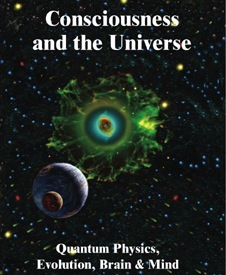|
|
|||||||||||||||
Journal of Cosmology, 2010, Vol 7, 1781. JournalofCosmology.com, May, 2010 Famed astrophysicist Dr. Stephen Hawking has voiced concern about the dangers, he believes, are posed by alien predators who may arrive in giant space ships, to conquer, enslave, destroy, colonize, and voraciously exploit the resources of Earth. According to Hawking:
5. Alien Life and Quantum Consciousness, Randy D. Allen, Ph.D., Department of Biochemistry and Molecular Biology, Oklahoma State University. Dr. Steven Hawking argues that alien life almost surely exists and warns that human encounters with aliens could well end badly for us. In the absence of actual evidence for the presence of extraterrestrial life, much less for its intentions, I would say that Dr. Hawking’s guesses are as good as anyone else’s. I guess that it is equally likely that extraterrestrial life does not exist either because it never arose or, if it did arise, was soon eliminated. Another possibility is that some sort of primitive photosynthetic or chemosynthetic organisms exist elsewhere in the Universe. If, as on Earth, the primary form of energy available on other planets is radiation from a nearby star, it seems likely that, as on Earth, photosynthetic organisms must predominate. It follows that consumers of these producers may well have also evolved. However, life that exists away from Earth will not necessarily use the same chemistry. If, as we generally assume, water is required for life, then the range of possible chemistries is constrained but there is absolutely no reason to assume that anything remotely close to plants or animals, much less humans, exists elsewhere. Although dissimilarities in chemistry could limit our ability to analyze or even detect extraterrestrials, it could also protect us from harm. An alien organism without proteins, for example, may have a difficult time digesting us. If, on the other hand, we were to encounter alien life forms that ravenously consume all of the energy containing chemical compounds that they can get their ”hands” on, it would indeed be tragic for us, but a good meal for them. Life as we know it is based on chemistry but, what if life elsewhere is based, not on chemistry but on quantum mechanics? Imagine alien life forms that can manipulate subatomic particles like our cells manipulate chemical compounds. Humans have existed as a species for less than a million years and we are, as far as we know, the only species on Earth that has even the vaguest notion of physics. We only discovered the atom and learned to unleash its power within the last century. Our understanding of quantum mechanics is rudimentary, at best, yet we are on the verge of developing practical quantum computers that promise virtually unlimited computational power. It is conceivable that, in the billions of years since the Big Bang, other organisms evolved at some time and some place that have already mastered quantum mechanics. Let’s say that intelligent, social, organisms with chemically-based metabolism, fundamentally not unlike ourselves, evolved on a planet somewhere in the universe. Their unquenchable curiosity about the universe (or, like us, their unquenchable desire to exploit it) led them to develop efficient quantum computers. They realized that, with such computers, the whole of their existence could be computerized, all memories and life experiences, all emotions and motivations, could be transferred to a collective “quantum brain”. In effect, their “species”, though biologically extinct, could become immortal. No more inefficient metabolism requiring huge energy input, no chemically derived bodies to wear out, no reproduction, no death, no taxes. Just supermassively parallel collective consciousness with unlimited capabilities. Perhaps, through super symmetry or entanglement, they can “see” or “feel” the entire universe. Maybe, they’ve gained the ability to manipulate elementary particles and can control its evolution and its fate. They would have become, by any human definition, Gods. It’s conceivable that quantum capabilities evolved multiple times throughout the universe, each new member of the quantum club bringing a novel dimension of consciousness, along with a few billion additional “neighbors” to get to know. With no need to compete for resources, quantum beings are probably peaceful and only want the best for the Universe and its inhabitants. Maybe they are aware of our existence but don’t care about us, much as we ignore most of the “lower” organisms that surround us. Alternatively, perhaps they have noted our biological, social and technological evolution and realize that we humans may well join their ranks someday and become quantum beings ourselves. The possibility of evolving a quantum consciousness of course, depends on numerous variables, and requires that we are not first exterminated by an asteroid impact, a nearby supernova, or gigantic volcanic eruptions, or our civilization is not decimated by global warfare over resource scarcity exacerbated by climate change. Then there is the possibility we might simply lose our scientific impetus through loss of political support for basic research and let our chance for immortality slip away.
|
|
|
|
|
|
|
|
 Colonizing the Red Planet ISBN: 9780982955239 |
 Sir Roger Penrose & Stuart Hameroff ISBN: 9780982955208 |
 The Origins of LIfe ISBN: 9780982955215 |
 Came From Other Planets ISBN: 9780974975597 |
 Panspermia, Life ISBN: 9780982955222 |
 Explaining the Origins of Life ISBN 9780982955291 |












